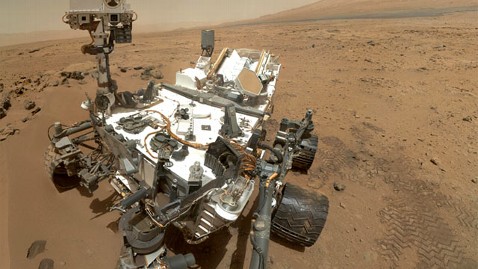Mars Curiosity Rover Finds Proof Life Could Have Thrived on Planet in Past
NASA says its Curiosity rover, drilling into a rock near its landing site, has found clear evidence that Mars, eons ago, could have supported living microbes. Mission scientists said today, in the words of Mike Meyer, NASA's chief Mars scientist, they've found "all the indications of being a habitable environment at one time."
Scientists said they had found from previous missions that the Martian surface was once warm and wet, but now they say Curiosity has given them evidence the water was much like water on Earth - not too briny, salty or alkaline for living things.
"We have found a habitable environment that is so benign and supportive of life," said John Grotzinger, Curiosity's project scientist, "that if you had been on Mars, the water would have been pure enough to drink."

Mars Curiosity rover in a self portrait from its robot arm. Image: NASA.
Curiosity used a tool on its robot arm to drill into a rock nicknamed "John Klein," after a Mars scientist who died in 2011. The powder from the drilling was dropped into a miniature laboratory on board the rover, where it could be heated to 2,000 degrees Fahrenheit. The gases that were produced could then be measured - carbon dioxide, forms of sulfur, calcium compounds and other chemicals that would only show up if the place had once been friendly to life.
"This rock looks like something you'd typically find on Earth," said Grotzinger.
Pictures: Mars Curiosity Rover Explores Mars
The scientists, laying out their chemical evidence in detail, emphasized that if there ever was life near Mount Sharp, where Curiosity landed last August, it is long gone. "It's not a puddle on Mars," said one of the lead experimenters, Paul Mahaffy. "It's now cold and dry there. Most of the atmosphere has escaped." But millions of years ago, it was very different, he said. "And it sure is fun to dig in the dirt there."
There will be more exploring to do, and the scientists said they would still like to see if there are organic compounds in the rocks. Curiosity has had computer problems in recent weeks that have slowed its ability to explore its landing site.
But John Grunsfeld, a former astronaut who now heads NASA's science efforts, said he applauded the Curiosity team.
"Did Mars ever have a habitable environment? Now we have the answer," said Grunsfeld. "Just sitting here, I'm giddy."